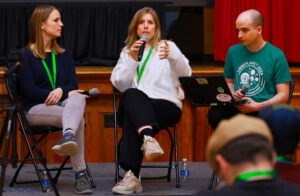“Secure by design” doesn’t mean that Linux users should take a carefree approach to security. On the Internet, somebody’s always hiding behind the firewall trying to pick the lock.
The FOSS Force Video Interview
Security expert and co-creator of the Linux-hardening (and now Unix-hardening) project Bastille Linux. That’s Jay Beale. He’s been working with Linux, and specifically on security, since the late 1980s. The greatest threat to Linux these days? According to Beale, the thing you really need to watch out for is your Android phone, which your handset manufacturer and wireless carrier may or may not be good about updating with the latest security patches. Even worse? Applications you get outside of the controlled Google Play and Amazon environments, where who-knows-what malware may lurk.
On your regular desktop or laptop Linux installation, Beale says the best security precaution you can take is encrypting your hard drive — which isn’t at all hard to do. He and I also talked a bit, toward the end, about how “the Linux community” was so tiny, once upon a time, that it wasn’t hard to know most of its major players. He also has some words of encouragement for those of you who are new to Linux and possibly a bit confused now and then. We were all new and confused once upon a time, and got less confused as we learned. Guess what? You can learn, too, and you never know where that knowledge can take you.
We know a guy, David Graham, whose long-time online nickname was cdlu, for “confused debian linux user,” and is now a member of Parliament in Canada. So you see, no matter where you start, your future is bright if you learn enough about Linux. Member of Parliament (or perhaps Congress)? Obviously achievable. Jay Beale runs a security consulting form, so that’s another possibility. And then there’s the most famous Linux newbie of them all: Linus Torvalds. Yep, even he was a new user once upon a time.
Robin “Roblimo” Miller is a freelance writer and former editor-in-chief at Open Source Technology Group, the company that owned SourceForge, freshmeat, Linux.com, NewsForge, ThinkGeek and Slashdot, and until recently served as a video editor at Slashdot. Now he’s mostly retired, but still works part-time as an editorial consultant for Grid Dynamics, and (obviously) writes for FOSS Force.











SourceForge may be in “static offline” mode …
I just want to say that I love the idea of this. Unfortunately when I go to the Bastille-Unix site?…it doesn’t even load. Mayhaps somethings wrong in their ISP’s end? I dunno, but I’ll give it another motnth then try again. In the interim since I already have encryption on my hard drives? I’ll just continue to use the rkhunter / ClamAV / and sniffer apps to keep as much of my info as secure as possible. Still…..would like to have this on a CD / DVD / USB to use in my toolkit when working on someone else’s machine.